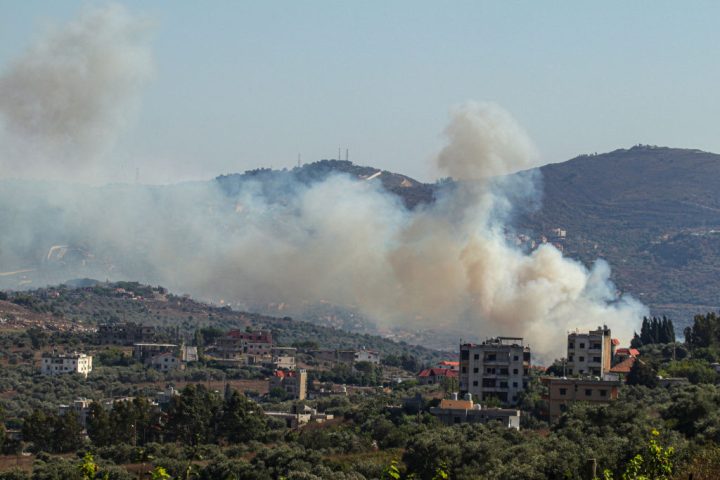On 27 July, 12 children from the Druze community of the Golan Heights were slaughtered when an Iranian Falaq 1 missile hit a soccer field in the town of Majdal Shams. The office of Israel’s Prime Minister, Benjamin Netanyahu, issued a terse statement on the same day vowing that the country would ‘not allow the murderous attack to simply pass on by, and that Hezbollah will pay a heavy price for this that it has not paid until this point’. This incident was the single bloodiest attack on an Israeli target since the massacres of 7 October. It represented a severe escalation in the conflict which has been under way in the Israel-Lebanon border area and its environs since Hezbollah opened its campaign of support for Hamas in Gaza.
The region now awaits Israel’s response, amid fears of a lurch towards all-out war on this front. Citizens of the UK, US and Germany have been urged to leave Lebanon.
Israel would need the US to re-supply them in the event of a war with Hezbollah
So what is likely to happen next? It may be taken as a certainty that Israel will not simply let the matter rest. The killing of the children in Majdal Shams represented a sharp departure from the tacit rules of the game which have applied in the north since 8 October, in which the focus has mainly been on targeting military personnel. These rules do not apply symmetrically. Hezbollah has systematically targeted civilian houses in Israeli border communities – but these are largely empty: over 60,000 Israelis have left their homes in these areas since the onset of conflict. Civilians have also been killed on the Lebanese side, though the great bulk of the Lebanese dead are Hezbollah fighters.
But while Israeli retaliation will certainly come, the form it will take is likely to determine whether the Majdal Shams killings will precipitate a larger war, or whether it will put an end to the episode. An Israeli strike on Hezbollah facilities and personnel in Beirut, or on Lebanese infrastructure in and around the Lebanese capital, might well trigger a further response from the Iran-backed Shia Islamist organisation. This could lead to a deterioration into all-out conflict. Similarly, a large-scale ground offensive into southern Lebanon, as advocated by some senior Israeli voices, would open the door to a larger conflict.
By contrast, an Israeli strike on Hezbollah closer to the border area, even if it resulted in death and injury to a significant number of the movement’s fighters, would – based on precedent – be more likely to be accepted by the organisation. Hezbollah, after all, has seen a heavy cull of fighters and commanders in the past months. The current number of the organisation’s dead since 8 October stands at over 383 members, alongside 68 members of allied organisations. This high number has not led Hezbollah to up the ante, because it and its patrons in Teheran appear to want the current situation of attrition to continue.
So which scenario is most likely?
As of now, a response within the parameters of the current conflict appears most probable. Public statements by US officials over the last 24 hours indicate Washington’s confidence that all-out war can be avoided. The Biden administration is very keen to avoid a new war in the Middle East in the run up to the US election. It is now known that they leant heavily on Israel to avoid major retaliation to the direct Iranian attacks on 13 April. At the time, Biden reportedly told Netanyahu: ‘If you launch a big attack on Iran, you’re on your own.’
Israel, with its army still engaged in Gaza, would need the US to re-supply them in the event of a war with Hezbollah. This gives the White House leverage, which it is likely to once again use to try and de-escalate the current mounting tension.
It’s worth noting that Iran’s calculus regarding Hezbollah differs significantly from its view of Hamas. The Palestinian Sunni group is a client of Teheran, but the relationship has been patchy over the years. Since 7 October, Iran has appeared ready to sacrifice Hamas if necessary, putting up a notable but limited campaign of proxy support for it. Hezbollah, by contrast, is flesh of the Teheran regime’s flesh. The group was established directly by the Islamic Revolutionary Guards Corps (IRGC) and is the jewel in the crown of proxies planted by Iran in Arab countries. As such, a major war between Israel and Hezbollah which put the latter’s continued existence at risk would be likely to trigger a general Iranian mobilisation of its assets, and a consequent wider conflict.
As demonstrated in April, the US wishes to avoid such a conflict. Israel isn’t looking for it either. The result is that Jerusalem’s response, when it comes, will likely be harsh, but within the confines of the tacit rules which have largely held since 8 October (and which were violently broken in Majdal Shams). As of now, the focus in Israel has shifted to the internal crisis triggered by the efforts of a mob to free a number of reservists detained on suspicion of abusing a Palestinian detainee. The attack in the north has not been forgotten, however, and will be responded to in the period ahead. Israel appears set to seek to do so in a way that will avoid a descent to all-out war with Hezbollah and Iran.







Comments